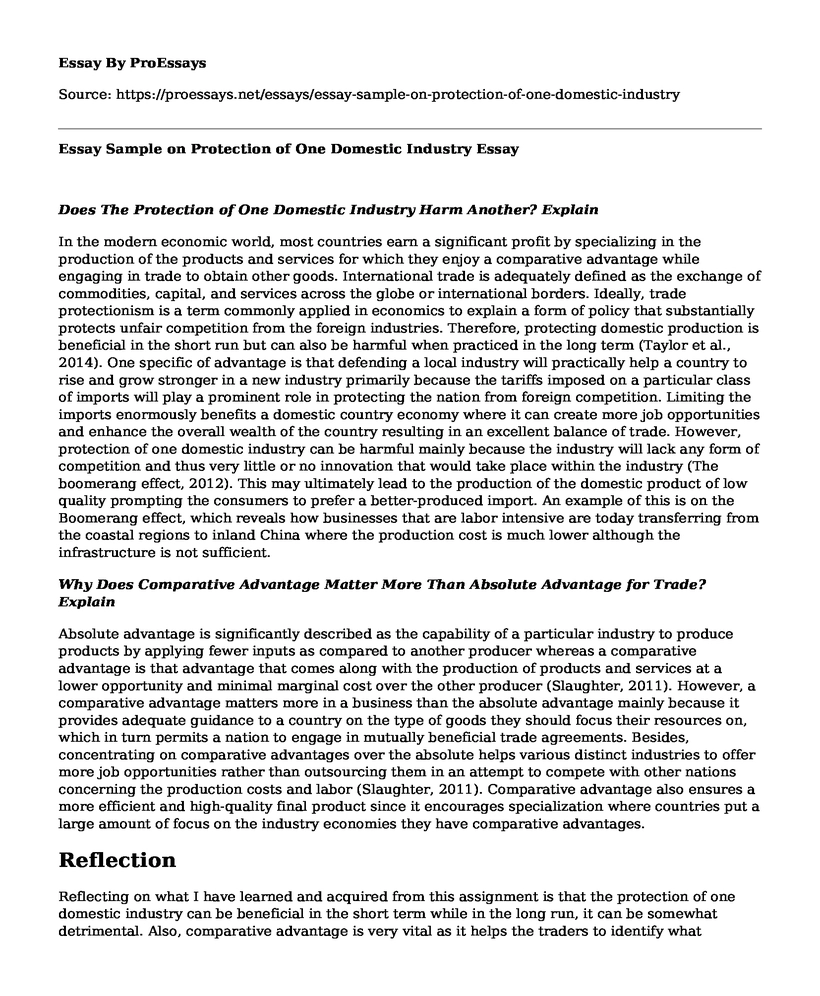Does The Protection of One Domestic Industry Harm Another? Explain
In the modern economic world, most countries earn a significant profit by specializing in the production of the products and services for which they enjoy a comparative advantage while engaging in trade to obtain other goods. International trade is adequately defined as the exchange of commodities, capital, and services across the globe or international borders. Ideally, trade protectionism is a term commonly applied in economics to explain a form of policy that substantially protects unfair competition from the foreign industries. Therefore, protecting domestic production is beneficial in the short run but can also be harmful when practiced in the long term (Taylor et al., 2014). One specific of advantage is that defending a local industry will practically help a country to rise and grow stronger in a new industry primarily because the tariffs imposed on a particular class of imports will play a prominent role in protecting the nation from foreign competition. Limiting the imports enormously benefits a domestic country economy where it can create more job opportunities and enhance the overall wealth of the country resulting in an excellent balance of trade. However, protection of one domestic industry can be harmful mainly because the industry will lack any form of competition and thus very little or no innovation that would take place within the industry (The boomerang effect, 2012). This may ultimately lead to the production of the domestic product of low quality prompting the consumers to prefer a better-produced import. An example of this is on the Boomerang effect, which reveals how businesses that are labor intensive are today transferring from the coastal regions to inland China where the production cost is much lower although the infrastructure is not sufficient.
Why Does Comparative Advantage Matter More Than Absolute Advantage for Trade? Explain
Absolute advantage is significantly described as the capability of a particular industry to produce products by applying fewer inputs as compared to another producer whereas a comparative advantage is that advantage that comes along with the production of products and services at a lower opportunity and minimal marginal cost over the other producer (Slaughter, 2011). However, a comparative advantage matters more in a business than the absolute advantage mainly because it provides adequate guidance to a country on the type of goods they should focus their resources on, which in turn permits a nation to engage in mutually beneficial trade agreements. Besides, concentrating on comparative advantages over the absolute helps various distinct industries to offer more job opportunities rather than outsourcing them in an attempt to compete with other nations concerning the production costs and labor (Slaughter, 2011). Comparative advantage also ensures a more efficient and high-quality final product since it encourages specialization where countries put a large amount of focus on the industry economies they have comparative advantages.
Reflection
Reflecting on what I have learned and acquired from this assignment is that the protection of one domestic industry can be beneficial in the short term while in the long run, it can be somewhat detrimental. Also, comparative advantage is very vital as it helps the traders to identify what products and services are worthy specializing in within a specific location and allows effective allocation of resources. In a beauty salon, a comparative advantage would be much better since it would let me to significantly decide on the type of work including pedicure, manicure or hairdressing that I should specialize in regarding the production costs that would, in turn, produce high-quality outputs or results.
References
Slaughter, M. J (2011). Comparative Advantage and American Jobs. Retrieved from https://www.wsj.com/articles/SB10001424052748703555804576102500952966450
Taylor, T., Greenlaw, S. A., Dodge, E. R., Gamez, C., Jauregui, A., Keenan, D., ... & Sonenshine, R. (2014). Principles of microeconomics. OpenStax College, Rice University.
The boomerang effect (2012). Retrieved from https://www.economist.com/special-report/2012/04/21/the-boomerang-effect
Cite this page
Essay Sample on Protection of One Domestic Industry. (2022, Dec 17). Retrieved from https://proessays.net/essays/essay-sample-on-protection-of-one-domestic-industry
If you are the original author of this essay and no longer wish to have it published on the ProEssays website, please click below to request its removal:
- Paper Sample on Global Financial System
- Effect of Globalization on the U.S. Labor Market Essay
- Globalization and Technology: Case Study of Walmart Paper Example
- Economics of a Monopoly Research Paper
- Younger Workers Report Biggest Gains In Happiness With Pay: Article Analysis Essay
- Essay Example on Uniting the World: One World Order for a Safer World
- Free Paper - Fostering Success: Interplay of Organizational Structure and Culture in Workplaces







